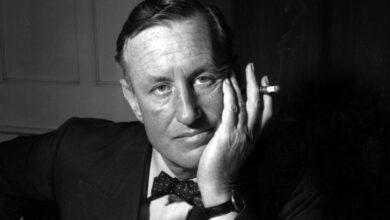Chandler on the therapist’s couch: how Matthew Perry’s painful memoir finds hope

The “bombshell revelations” from Matthew Perry’s memoir – the first by a Friends cast member – have been trickling out for weeks: Perry was sober for only one of Friends’s 10 seasons. He had a years-long crush on Jennifer Aniston and was unceremoniously dumped by Julia Roberts, whom he had wooed by fax machine in 1994. Since his mid-twenties, Perry has spent “upward of $7m” trying to overcome an addiction to alcohol and pills, entered rehab 65 times, and “nearly died” more than once.
Even before the worldwide release of Friends, Lovers, and the Big Terrible Thing this week, Perry was compelled to issue a retraction over a sentence that hadn’t yet been published. Writing on the tragic drug-related deaths of his co-stars River Phoenix and Chris Farley, Perry laments – more than once – that somehow “Keanu Reeves still walks among us”. (Now, Perry says he wishes he’d used his own name instead of that of the internet’s boyfriend.)
So you’d be forgiven for thinking, with all the pre-spilt tea and (possibly contrived) drama, that actually sitting down to read Perry’s book would be a redundant exercise. But as a name-dropping account of a guy who used to be super famous, it still performs with alacrity. Perry goes out of his way, for example, to squeeze in the time Cameron Diaz decked him, and what he thought of Salma Hayek’s acting advice (“long-winded”).
And while the book is far from an encyclopaedic account of life on the Friends set, no stan’s library would be complete without its cringey admission that Perry delivered the last ever line of series dialogue because he had begged for the chance to do it.
Over the course of 272 easily devoured pages, though, I started to think of Friends, Lovers not as a celebrity memoir about addiction, but as an addiction memoir, written by a man who understands his own history through the prism of showbiz. Lying in a hospital bed after the “explosion” of his colon, the actor wryly considers his situation: “The Matthew Perry Show, cancelled by opiates.” Really, “Matty” (as he implores readers to call him) – you’re thinking in Hollywoodese even on the edge of death?
But it’s the language in which Perry has lived since, at 15, he left his mother’s home in Canada to live with his actor father in Los Angeles. For example, the actor tracks his addiction not in years but in “seasons”, as in: “If you watch season three of Friends, I hope you’ll be horrified at how thin I am”, and “I must have lost fifty pounds in the off-season”. He’ll seek treatment, he tells himself, in just a few more episodes.
Instead of searching for writerly flourishes, Perry approaches the subject of his hard life with naturalistic prose, which he peppers with self-deprecating asides rather than grandiose pontificating. In a passage about a recent tour through rehab, he jokes: “The Pain hurt so much I’d stopped smoking, which if you knew how much I smoked, you’d think was a pretty sure sign that something very serious was wrong.”
And there are abundant shades of what the actor brought of himself to Chandler Bing, a character who papered over his insecurity with humour. When an assistant suggests that the Pain – so extreme it must be capitalised – is bad enough for him to go to hospital, Perry answers, “That sounds like a pretty damn good idea to me.” The inflections of his writing are entirely plausible as dialogue from some long-lost Friends episode – “The One Where Chandler Suffers Unimaginably”.
And the book isn’t without a celeb memoir’s cruder delights, including the outrageous price-tag of luxury (Perry pays $175,000 (£152,000) for a private flight home from a Swiss rehab facility) and the frisson of gossip. Perry’s never cruel in discussion of his famous lovers, though he doesn’t pull punches. Instead, he lightly anonymises them. I’m embarrassed to say how many browser windows I opened while reading: “matthew perry girlfriend 1994” and, worse, “matthew perry girlfriend british husband now”.
At 53, Perry’s not an expert on recovery; he’s never done it for long enough. But he’s an expert on himself. That he’s interrogated his past, his mistakes, his worst memories so thoroughly is one of rehab’s hard-won gifts, and the book’s strongest asset, even when the narrative seems to drip with the gymnastics of analysis.
Perry writes repeatedly of the sense of abandonment he felt, aged five, when he flew to see his father as an “unaccompanied minor”, but rarely of his father – who left the family when Perry was just one – as a man who abandoned him. It’s the acute memory of the flight that dogs him rather than the bare facts of the situation, which feels more plausible the more you imagine Perry talking about it from a therapist’s settee.
For all the bad memories it resurfaces, Friends, Lovers, and the Big Terrible Thing is a hopeful read. In fact, Perry dedicates his book to “all of the sufferers out there” and, in its final moments, it’s to this audience – not his fan base – that he earnestly returns. “Addiction, the big terrible thing, is far too powerful for anyone to defeat alone,” Perry writes, naming what he avoids in the memoir’s title. “But together, one day at a time, we can beat it down.”





